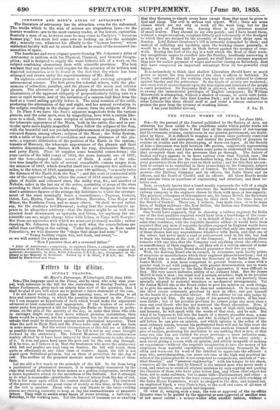letup In flit Cain.
SUNDAY TRADING.
a Mark's Parsonage, Whitechapel, 27th June 1855. Sin—The language used in the Times, and by those who echo that jour- nal, with reference to the bill for the restraining of Sunday Trading now before Parliament, gives such an utterly false view of the question, that I shall be glad if you will allow me to present a fairer statement of the case.
I do not know what could excuse the sneering tone, so insulting to at true and earnest feeling, in which the question is discussed in the Times; but I can imagine an hypothesis of facts which would make the arguments advanced at least consistent and appropriate. If the leaders of an aristo- cratio party had proposed a bill for closing the Parks on Sundays to pedes- trians, on the plea of the sanctity of the day, in order that those who ride in carriages might enjoy their drive without plebeian molestation, then there would be a reason, not for a careless sneer, but for the most indignant rebuke that could be thundered against such pharisaical hypocrisy. Then what the mob in Hyde Park and the Times have said would suit the facts in some measure. but the actual circumstances of this bill are as different as possible from that imaginary case. The bill is not in any sense brought forward by the aristocracy. The Liberal Members for the constituencies mainly affected by it have been induced by their constituent's to take charge of it. It does not press hard upon the poor and let the rich slip through. If it be true, as I believe it is, that the tradesmen who serve the aristocracy with fish and poultry are kept busy on Sunday, the bill will touch them quite as effectually as any other class of dealers. Again, the bill is not urged upon Sabbatical grounds, but on those of protection for the day of rest. The scoffers at the proposed measure must surely be aware of these
Let me add a few words on the principle of the bill. So far from being a puritanical or pharisaical measure, it is unsparingly denounced by the class that would be called by those names as a godless compromise, involving a direct legislative attack on the sacredness of the Sabbath. But it attempts to do what is reasonable—practicable—to bar out labour froth the day of rest. This is the issue upon which the contest should take place. The overwork of the poorer classes is one great curse of society at this time, as the idleness of the rich is another. Those who are real friends to the hard-working classes are striving earnestly to keep at bay the encroachments of excessive
ktImit. They with to secure some hours of every evening, a half-day on Wrday, to the working man, Bet the demands of business are so exacting
that they threaten to absorb every hour except those that must be given to food and sleep. The evil is serious and urgent Well ; there are some claws which are not only at work all the week long, but for the greater part of Sunday too. Among these is an immense number of small dealers. They abound in my own parish; and I have heard them, without a single exception, complain bitterly and vehemently of the drudgery to which they are doomed by the necessity of keeping their shops open on Sunday. Lord Robert Grosvenoes bill is earnestly demanded by them; and instead of inflicting any hardship upon the working classes generally, it would be a firm stand made in their favour against the tyranny of over- work. Buying the food of the day is a task which the flood of their week- day occupations causes to overflow into the Sunday, needlessly narrowing it as a day of rest If this bill be passed, we shall have a stronger argument than now for earlier payment of wages and earlier closing on Saturdays. Rest will have conquered an important advantage from its too-powerful rival labour.
It is melancholy to think that shallow Liberalism should have so much power to injure the true interests of the class it affects to befriend. No doubt, vast numbers of the working class may be easily induced to clamour against bigotry and the aristocracy. So the bonds of society are weakened ; and every sort of encroachment upon the true rights and interests of the people is easily permitted. Sir Benjamin Hall is allowed, with scarcely a protest, to swamp the immemorial privileges of English ratepayers; Sir William Molesworth is attempting, without a shadow of excuse, to cover with build- ings a fifth part of the only East London Park ; and it is but natural that other Liberals like them should scoff at and resist a sincere endeavour to protect the poor from the tyranny of crushing labour. I am your faithful servant, J. L.h. D.


































 Previous page
Previous page